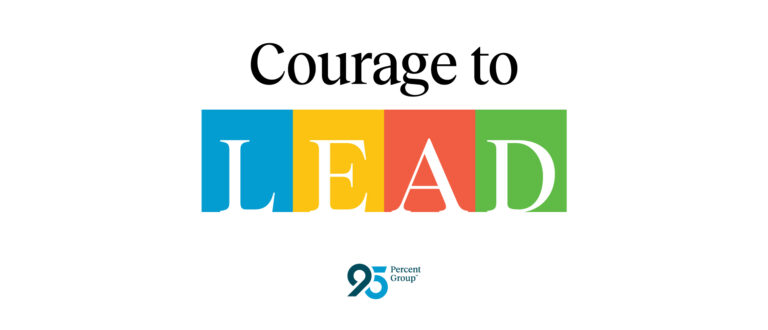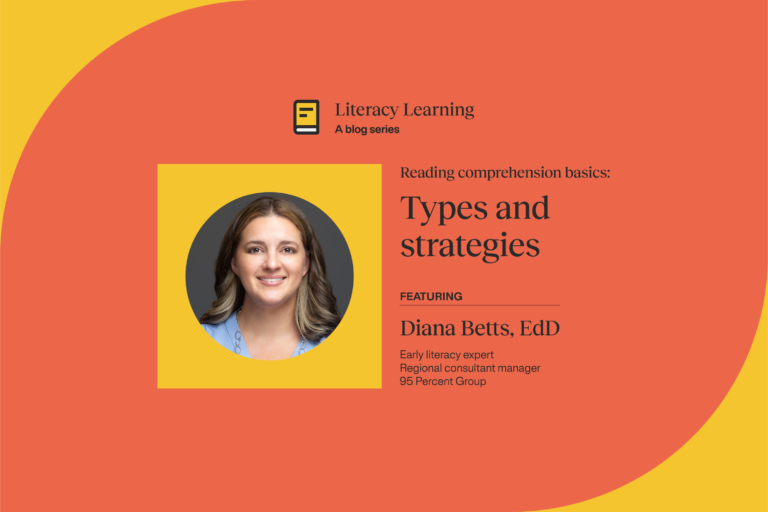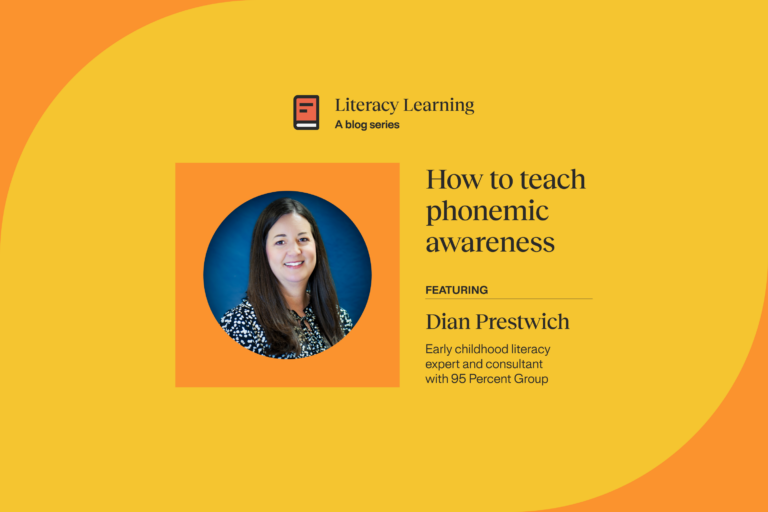Unlock the leader within you: Guiding principles of courageous literacy leadership
Two stars from our Courageous Leaders webinar series, Danielle ‘Nell’ Thompson, PhD, CCC-SLP, and Terrie Noland, PhD, CALP, explain why literacy leadership matters and how to make the most of it in today’s education landscape.

In today’s rapidly changing educational landscape, courageous leadership is essential for addressing literacy education’s diverse challenges and opportunities, and it is the only way to build sustainability for a literate and thriving nation. Extensive research has been done in the last 50 years on how children learn to read, yet, as a nation, we have not moved reading proficiency rates. The question must be asked, “why”? Quite possibly, there has been a consistent missing component: how to lead the work.
Literacy leadership is a pivotal element in shaping the educational landscape and driving societal progress. A strong literacy leader not only ensures that students acquire essential reading, writing, speaking, and listening skills but also nurtures a culture of lifelong learning, not only among students, but among colleagues.
Principle 1: Literacy is always a priority
First and foremost, literacy leaders must understand that literacy is always a priority. Intention and focus on literacy must stem from a deep understanding that literacy is the foundation upon which all other learning is built, and the reason why it must always be at the forefront of thinking and planning. Literacy leaders understand that equipping students to be proficient in literacy is the first step towards academic and personal success. It is the gateway to acquiring knowledge, understanding various subjects, and pursuing higher learning. Without literacy, access to educational opportunities is severely restricted.
When our schools get the language foundations of literacy and the instruction of literacy right, they build the bedrock by which all other learning is built. Leaders who consistently focus on literacy, along with all other initiatives, set a compelling example for both students, their fellow educators, and their communities.
There are many reasons why literacy must become a priority and stay a priority. These reasons extend well beyond reading an assigned text and completing homework for a grade. For complete literacy transformation to occur, the future of a school community must be defined by a vision that requires intentional and daily work. Solidifying and strengthening literacy for all students has a long-term positive impact on the future of our country.
Principle 2: Literacy transformation will only happen when this work is led well
Not only must literacy leaders become hyper-focused on the importance of literacy, but they must understand that leadership is essential when moving toward school transformation. To do this well, we first must understand that leadership in education is not about holding a title, position, or sitting in a certain seat or office. Leadership is not position, but disposition. It’s about one life influencing another life. In fact, leadership is about getting out of the assigned seat and spending time walking halls, talking with educators who are teaching reading, being present in buildings where the work is happening, and maybe even giving high fives. Leadership is about modeling personal growth and knowledge building together as a learning community with educators. Leadership is the ability to connect, guide, inspire, and influence others to achieve shared goals that move everyone towards a bigger vision in shared trust.
When a deep understanding of literacy combines with the understanding of what it means to lead, there is a beautiful convergence that will drive literacy change forward.
“The first priority in leading transformative change in literacy is to create a team of diverse and invested parties to ask those big questions and take those bold steps,” said our colleague Laura Stewart, Chief Academic Officer at 95 Percent Group.
And that is exactly right. Literacy leaders establish literacy teams. They sit across from a teacher to learn from them. They not only create the vision, but continually and repetitively cast that vision.
Literacy leaders ground themselves in the evidence and research about reading instruction—they learn, unlearn if necessary, and re-learn about how a child learns to read, but also, about how to lead. They ask this tough, fundamental question in a productive way: What is the percentage of students reading at or above grade level in our school or district?
“It is important to emphasize that when we are not reaching our shared goal of literacy for all, it is not about blame; it is about a leader bringing awareness to the school community that there is a gap between where we are and where we could be, and that gap creates the space for transformative change,” said Stewart.
Literacy transformation will never happen if an individual that holds a position does not understand the challenges they face, help others understand those challenges, grow their own leadership abilities, and build a team of great leaders that build and sustain the necessary, long-term change.
Principle 3: Literacy leaders become aware of literacy wobbles and leader moves
Oftentimes, school leaders have uphill hopes and downhill habits. We have great vision for our schools and districts; however, the task management of daily work gets in the way from stepping fully into a vision where an entire student body can read proficiently. Literacy leaders must realize and become fully aware of the wobbles of literacy leadership and know how to counteract those wobbles with an appropriate move. Allowing downhill habits of task management to control daily work is a wobble that needs to be tackled. Courageous literacy leaders recognize this action and will become intentional about focusing time and attention on actionable steps towards literacy transformation.
Whether you are a seasoned literacy leader, aspiring to take on leadership roles, or prepared to lead from where you are, you must be equipped with the knowledge, tools, and inspiration to become a courageous literacy leader. Courageous literacy leadership is about transforming literacy education to the point that 95 percent or more students can read proficiently. Leading with love, passion, enthusiasm, and an insatiable desire to continue learning, we will build a nation of literate students that will design new technologies, discover new remedies, solve some of the world’s toughest challenges, and give back to their communities and the world.

Danielle ‘Nell’ Thompson
Danielle ‘Nell’ Thompson, PhD, CCC-SLP, is a coach, influencer for literacy change, literacy leader, teacher of teachers, and, insatiably curious about all things that make people’s lives better. She is an agent of positive change working to help leaders and educators re-think, unlearn, and up-level their knowledge, leadership skills, instructional practices, and collective impact. From her rural roots in North Dakota to her time spent as a Peace Corps volunteer in a school for the deaf, she spent a decade working as a PreK-12 speech language pathologist and educator in Colorado, Montana, and Alaska public schools. And then one day, Dr. Nell realized she needed to do more for those who could not read and who were not being reached due to broken systems. She became a research scientist, one of the original national LETRS trainers, and she studied leadership. Currently, she reaches, teaches, and leads educators and leaders as the President and Founder of The Transformative Reading Teacher Group, President of The Reading League Montana, a Certified High-Performance Coach, a Maxwell Certified Leadership Speaker and Coach, and the Founder and creative force for change behind The Big Sky Literacy Summit.

Terrie Noland
For 27 years, Terrie Noland, PhD, CALP, has put her energy into leadership and literacy, first as a teacher and administrator and now as a national Literacy Leader. Dr. Noland mentors leaders about the latest research around the science of reading and the leadership characteristics to leave a legacy. She speaks to crowds to offer captivating stories, leadership principles, research, and best literacy practices, which she always delivers with inspiration. Dr. Noland is a Certified Academic Language Practitioner and has her PhD in literacy. She is Maxwell Leadership Certified and a President’s Advisory Council member. She has experience building award-winning communities of educators to lead large in literacy and professional learning experiences that drive high-leverage growth for administrators and educators.
Watch on-demand: Courageous leaders webinar series!
Join Laura Stewart, Chief Academic Officer, as she hosts Courageous Leaders, a transformative webinar series featuring insightful discussions with prominent literacy changemakers. Whether you’re a practiced literacy leader or newly aspiring to these roles, our thought leadership sessions will provide the knowledge, tools, and inspiration to empower the next generation of readers and lifelong learners.
Laura shares in-depth insights and best practices through regular editorial resources accompanying each webinar. This series is now available to watch on-demand. Register to watch now!



